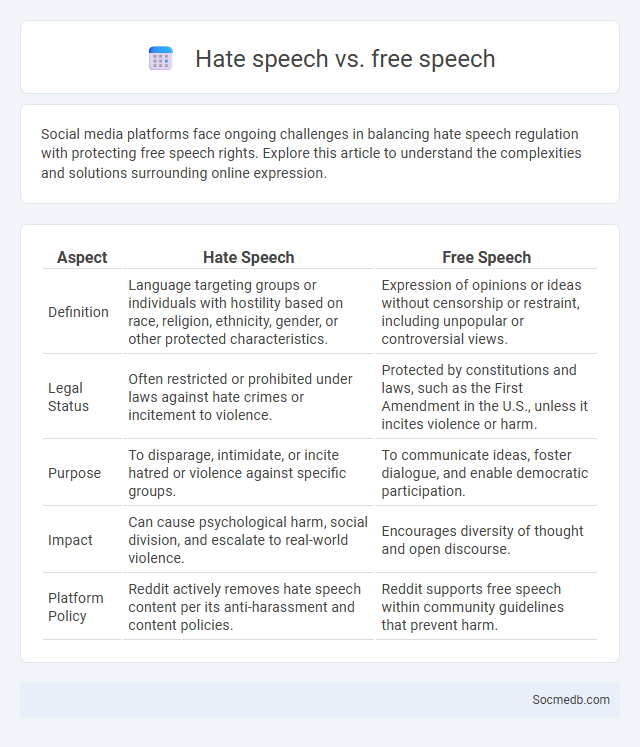
Photo illustration: hate speech vs free speech
Social media platforms face ongoing challenges in balancing hate speech regulation with protecting free speech rights. Explore this article to understand the complexities and solutions surrounding online expression.
Table of Comparison
| Aspect | Hate Speech | Free Speech |
|---|---|---|
| Definition | Language targeting groups or individuals with hostility based on race, religion, ethnicity, gender, or other protected characteristics. | Expression of opinions or ideas without censorship or restraint, including unpopular or controversial views. |
| Legal Status | Often restricted or prohibited under laws against hate crimes or incitement to violence. | Protected by constitutions and laws, such as the First Amendment in the U.S., unless it incites violence or harm. |
| Purpose | To disparage, intimidate, or incite hatred or violence against specific groups. | To communicate ideas, foster dialogue, and enable democratic participation. |
| Impact | Can cause psychological harm, social division, and escalate to real-world violence. | Encourages diversity of thought and open discourse. |
| Platform Policy | Reddit actively removes hate speech content per its anti-harassment and content policies. | Reddit supports free speech within community guidelines that prevent harm. |
Understanding Hate Speech: Definition and Impacts
Hate speech on social media refers to expressions that incite violence or discrimination against individuals based on race, ethnicity, religion, gender, or sexual orientation, posing significant psychological and societal harms. Its spread can fuel division, reduce social cohesion, and increase the risk of real-world violence, making recognition and prevention essential for maintaining a safe online community. Understanding hate speech helps you identify harmful content and promotes respectful interactions, ensuring a healthier digital environment for all users.
What Constitutes Free Speech?
Free speech on social media encompasses your right to express opinions, share information, and engage in dialogue without unjust censorship or restriction. Platforms balance this right with policies that prevent hate speech, misinformation, and harmful content to maintain a safe online environment. Understanding these guidelines helps you navigate the limits of free expression while protecting community standards.
Rule Violations: Policies and Enforcement
Social media platforms enforce strict policies to prevent rule violations related to hate speech, harassment, misinformation, and copyright infringement. Violations can result in account suspensions, content removal, or permanent bans, emphasizing the importance of adhering to community guidelines. Your responsible participation helps maintain a safe and respectful online environment.
Key Differences Between Hate Speech and Free Speech
Hate speech involves language that attacks or demeans a group based on race, ethnicity, religion, gender, or sexual orientation, posing threats to individual safety and social harmony. Free speech protects your right to express opinions and ideas without censorship, provided it does not incite violence or hatred against others. Understanding these distinctions is crucial for navigating social media platforms responsibly and respecting community guidelines.
Legal Perspectives: Navigating Gray Areas
Social media platforms increasingly face complex legal challenges involving privacy, intellectual property, and content moderation. Ambiguities in laws such as the Computer Fraud and Abuse Act and Section 230 of the Communications Decency Act create gray areas that complicate enforcement and liability. Legal teams must continuously interpret evolving regulations to ensure compliance while protecting user rights and corporate interests.
The Role of Social Media Platforms
Social media platforms serve as dynamic hubs for communication, content sharing, and community building, shaping how individuals and businesses interact online. These platforms utilize advanced algorithms to tailor content, enhance user engagement, and drive targeted advertising, influencing both consumer behavior and brand visibility. Your ability to leverage social media effectively can amplify your message, expand your network, and foster meaningful connections worldwide.
Consequences of Rule Violations Online
Consequences of rule violations online include account suspension, content removal, and permanent bans from social media platforms. Your digital reputation can be severely damaged, leading to loss of followers, reduced engagement, and potential legal repercussions. Platforms employ automated systems and user reports to enforce community guidelines strictly, ensuring compliance and safety for all users.
Balancing Freedom of Expression with Community Safety
Social media platforms face the challenge of balancing freedom of expression with community safety by implementing content moderation policies that respect user rights while preventing harmful behavior. Advanced algorithms and human reviewers work together to detect and remove hate speech, misinformation, and cyberbullying without infringing on legitimate discourse. Transparent guidelines and user appeals processes enhance trust and ensure accountability in maintaining a safe online environment.
Case Studies: Real-World Examples and Implications
Case studies in social media reveal how brands like Nike increased engagement by tailoring content to specific audiences and leveraging influencer partnerships. Analyzing your competitor's campaigns provides insights into effective strategies and potential pitfalls, improving your content planning and targeting. These real-world examples highlight the importance of data-driven decision-making and adaptive marketing tactics in achieving measurable results.
Moving Forward: Solutions and Best Practices
Implementing robust content moderation policies and leveraging AI-driven algorithms enhances the quality and safety of social media platforms. Encouraging digital literacy and transparent communication fosters healthier online communities and mitigates misinformation. Prioritizing user privacy through encryption and consent-based data sharing builds trust and supports regulatory compliance.
 socmedb.com
socmedb.com